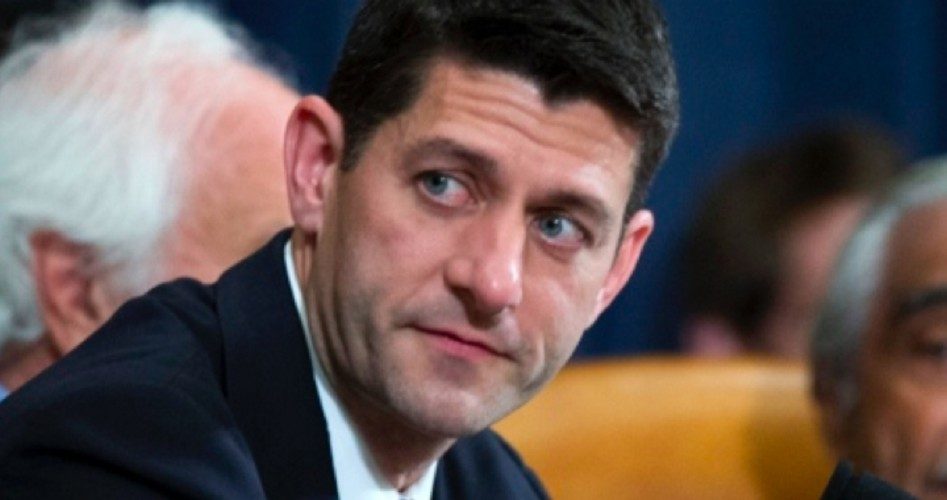
With the House Republican leadership in turmoil after the unexpected withdrawal of Majority Leader Kevin McCarthy from consideration for speaker, Republicans and the establishment media have professedly anointed a new heir to John Boehner’s seat. Former vice-presidential candidate and Wisconsin congressman Paul Ryan (shown) is being pressured to put his name in the hat, although he has so far refused to do so. Congressman Ryan, it has been suggested, is reluctant to take the reins of House leadership because he is concerned that the endless controversy and turmoil afflicting the House may spoil his chances for a presidential bid in the future. Still, with John Boehner refusing to step down until an heir-apparent steps up, Congressman Ryan may eventually allow himself to be persuaded.
The youthful and energetic Ryan is well-liked by most of his Republican colleagues, and his selection as Mitt Romney’s running mate in the last presidential election has made him a household name. But Ryan — like Boehner and his previous anointed successor, Kevin McCarthy — is no principled advocate of limited constitutional government. Instead, his voting record shows him to be a typical Beltway big government “conservative,” eager to find “common ground” with the Democrats he was elected to oppose — in other words, to continue to grow government and government spending, but at a less manic clip than the Democrats want.
{modulepos inner_text_ad}
Ryan has represented Wisconsin’s 1st congressional district since 1999, and has served as the chairman of the House Budget Committee since 2011. As such he is arguably one of the most powerful people in Washington, since his committee has the important role of setting annual spending limits. In theory at least, these limits are inviolable, since it is the House that is granted by the U.S. Constitution final power over the purse strings of the federal government. In particular, the Budget Committee is expected each year to pass a “concurrent resolution” on the budget that lays out how much money will be spent and how much revenue raised each fiscal year. A concurrent resolution, not being true legislation, does not require a presidential signature and is technically non-binding. But in the hands of principled leadership, such a resolution can be a powerful tool for encouraging political consensus — in this case, on levels of government spending. Congressman Ryan and a handful of other House members with oversight of the budget, spending, and raising revenue, should therefore have ultimate say over how Washington spends our money.
It is therefore more than passing strange that one of Paul Ryan’s signature accomplishments during his tenure as House Budget Committee chair was the passage of the Bipartisan Budget Act of 2013, which Ryan co-sponsored along with Democratic Senator Patty Murray, one of the most radical left-wing members of the entire legislature. Touted as a grand compromise, the Bipartisan Budget Act rolled back some of the restrictions imposed by the sequesters — restrictions that Republicans promised to reinstate according to the terms of the act, but which have subsequently been dropped in the memory hole. The act raised government spending in 2014 and 2015, in exchange for promises that spending would be cut thereafter, promises that have failed to materialize once the Big Government spenders got what they wanted.
The bill was intended to lower the deficit by a projected $23 billion, a laughable amount given the fact that annual budget deficits are projected to average about $500 billion per year in to the 2020s. Those are better than the trillion-plus dollar annual deficits logged during the depths of the Great Recession, but still amount to roughly half a trillion dollars per year added to the total federal debt (and those are the rosiest predictions, which very seldom come to pass where government spending is concerned). Although the bill’s sponsors claimed that it did not raise taxes, airline fees were raised significantly. No entitlement programs were touched in any way. In effect, the bill was a successful bid by Democrats to maintain the tax, borrow, and spend status quo, gutting the hated sequesters into the bargain.
The Bipartisan Budget Act was roundly criticized by the few partisans of liberty remaining in the House. Republican Raul Labrador (one of very few congressmen to have earned a 90 percent or higher cumulative Freedom Index) pointed out that “[the bill] makes promises to the American people that are false. Today the Democrats realized they were right all along, that we would never hold the line on the sequester.” Senators Rand Paul and Marco Rubio both opposed the bill, with Rubio calling it “irresponsible” and maintaining that the bill “cancels earlier spending reductions, instead of making some tough decisions about how to tackle our long-term fiscal challenges caused by runaway Washington spending.” For his part, Ryan defended the bill for allowing no new spending (false) while cutting the deficit (by a trivial amount). The passage of this grotesque cave to obstreperous Democrats is one of the major reasons that Speaker John Boehner is perceived by his colleagues as unwilling to hold to electoral promises to reduce the size of government and cut government spending. And the charismatic Ryan has been his more mediagenic sidekick.
Ryan’s “Path to Prosperity” budget proposals would extend the fiscal irresponsibility well into the next decade, with a balanced budget not being attained until at least 2023. Fatuous statistics envisage annual budget deficits for the latter half of this decade and into the next in the tens of billions of dollars — instead of the hundreds of billions that we are actually seeing — before finally melting away into a surplus of 7 billion dollars in 2023. This, while government spending continues to rise vertiginously by almost two trillion dollars during that same period.
As for Paul Ryan’s other accomplishments, he has been a staunch supporter of trade promotion authority (TPA; also known as “fast track authority”) for the president, including President Obama. By supporting the TPA, Congress has surrendered one of its most important constitutional prerogatives to the executive branch, the authority to give advice and consent to the president on all treaties. Under the terms of the TPA, the president retains his authority to negotiate trade deals (a kind of treaty), but Congress is not permitted to filibuster, amend, or otherwise modify them once the president presents them; they may only vote up or down on them in their entirety. It is a curious instance of cognitive dissonance that the same clique of accomodationist Republicans who urge compromise and discussion on us when it comes to the preparation, modification, and passage of omnibus spending bills insist that no such messy mechanisms apply to the passage of international trade legislation.
As for Paul Ryan’s own Freedom Index record, his cumulative score is a tepid 58 percent, little higher than that of the man he may replace as speaker. His initial score, in the 106th Congress, was 56 percent, but it has dropped as low as 46 percent (108th Congress), and most recently registered 50 percent (114th Congress). His lone respectable score, 89 percent, came during the 111th Congress (2009-2010), when House Republicans were an embattled minority alongside their outnumbered Senate colleagues during the first two years of the Obama presidency. Such numbers speak volumes about the reliability of Paul Ryan when Republicans are actually in a position to force real change — times like right now. There can be little doubt that as speaker of the House Ryan would do little more than his predecessor to enforce fiscal sanity and promote liberty on Capitol Hill.
Photo of Rep. Paul Ryan: AP Images



